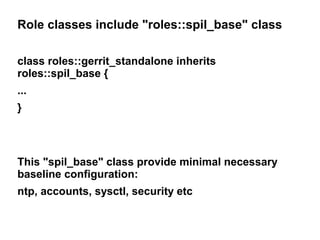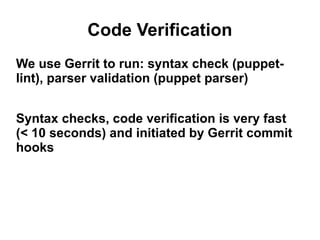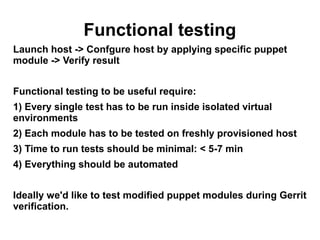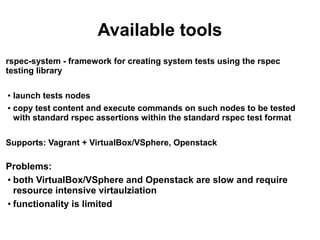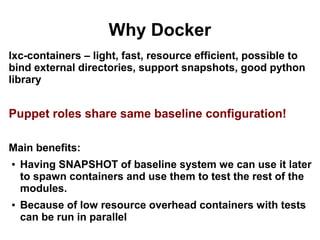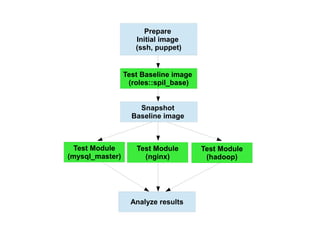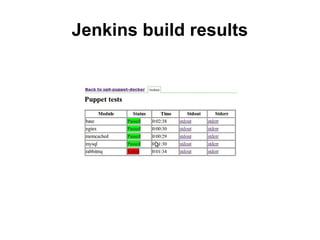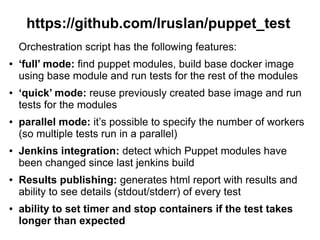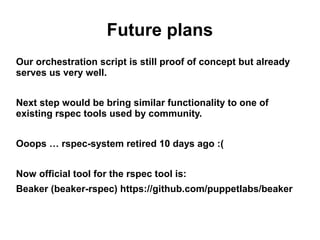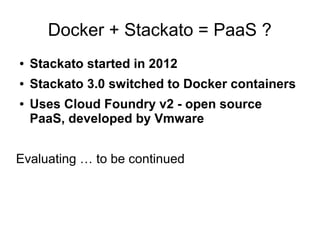Docker meetup
- 2. Me and lxc-containers 2011 Hyves (now part of TMG) chat service - python service, single threaded (GIL) Solution: lxc-containers (since 2010!!!): 100+ instances AUFS: advanced multi layered unification filesystem Gentoo: patched kernel
- 3. 2013 SpilGames a global network of online gaming platforms (180 million active users each month) and growing Technology used: Production: PHP, Erlang Internally: Python Platform: Scientific Linux Private cloud: Openstack
- 4. Openstack at SpilGames Swift in production since Diablo 2011 Swift - highly available, distributed, eventually consistent object/blob store Compute in production since Folsom end of 2012 Compute - cloud computing fabric controller
- 5. Goal: IaaS, migrate most of production systems to private cloud Ultimate Goal: PaaS, Autoscaling
- 6. SpilGames infrastructure today Two locations: Amsterdam, Toronto Two openstack availability zones Both sites serve live traffic
- 7. Puppet Intro $puppet apply test.pp Manifest file test.pp: file {'testfile': path => '/tmp/testfile', ensure => present, mode => 0640, content => "I'm a test file.", } service { 'ntp': ensure => running, enable => true, }
- 8. Puppet in SpilGames Every server has puppet role registered and assigned in CMDB (Configuration Management Databse): hadoop_datanode gerrit_standalone During puppet run, role gets resolved and mapped to the puppet class with the same name: class roles::hadoop_datanode class roles::gerrit_standalone
- 9. Role classes are used as containers for the rest of puppet classes which provide actual configuration: class roles::gerrit_standalone inherits roles::spil_base { class{ '::nginx': port => 80, } class{ '::gerrit': mysql_host mysql_user mysql_password mysql_db } => '127.0.0.1', => 'gerrit2', => 'gerrit2', => 'reviewdb', class { '::mysql::server':} mysql::db { 'reviewdb':} Class['::nginx'] â Mysql::Db['reviewdb'] â Class['::Gerrit'] }
- 10. Role classes include "roles::spil_base" class class roles::gerrit_standalone inherits roles::spil_base { ... } This "spil_base" class provide minimal necessary baseline configuration: ntp, accounts, sysctl, security etc
- 11. Code Verification We use Gerrit to run: syntax check (puppetlint), parser validation (puppet parser) Syntax checks, code verification is very fast (< 10 seconds) and initiated by Gerrit commit hooks
- 12. Functional testing Launch host -> Confgure host by applying specific puppet module -> Verify result Functional testing to be useful require: 1) Every single test has to be run inside isolated virtual environments 2) Each module has to be tested on freshly provisioned host 3) Time to run tests should be minimal: < 5-7 min 4) Everything should be automated Ideally we'd like to test modified puppet modules during Gerrit verification.
- 13. Available tools rspec-system - framework for creating system tests using the rspec testing library launch tests nodes â copy test content and execute commands on such nodes to be tested with standard rspec assertions within the standard rspec test format â Supports: Vagrant + VirtualBox/VSphere, Openstack Problems: â both VirtualBox/VSphere and Openstack are slow and require resource intensive virtaulziation â functionality is limited
- 14. Why Docker lxc-containers â light, fast, resource efficient, possible to bind external directories, support snapshots, good python library Puppet roles share same baseline configuration! Main benefits: â â Having SNAPSHOT of baseline system we can use it later to spawn containers and use them to test the rest of the modules. Because of low resource overhead containers with tests can be run in parallel
- 15. Prepare Initial image (ssh, puppet) Test Baseline image (roles::spil_base) Snapshot Baseline image Test Module (mysql_master) Test Module (nginx) Analyze results Test Module (hadoop)
- 17. https://github.com/lruslan/puppet_test Orchestration script has the following features: â â â â â â âfullâ mode: find puppet modules, build base docker image using base module and run tests for the rest of the modules âquickâ mode: reuse previously created base image and run tests for the modules parallel mode: itâs possible to specify the number of workers (so multiple tests run in a parallel) Jenkins integration: detect which Puppet modules have been changed since last jenkins build Results publishing: generates html report with results and ability to see details (stdout/stderr) of every test ability to set timer and stop containers if the test takes longer than expected
- 18. Future plans Our orchestration script is still proof of concept but already serves us very well. Next step would be bring similar functionality to one of existing rspec tools used by community. Ooops âĶ rspec-system retired 10 days ago :( Now official tool for the rspec tool is: Beaker (beaker-rspec) https://github.com/puppetlabs/beaker
- 19. Docker + Stackato = PaaS ? â Stackato started in 2012 â Stackato 3.0 switched to Docker containers â Uses Cloud Foundry v2 - open source PaaS, developed by Vmware Evaluating âĶ to be continued
- 20. Spil Games are hiring

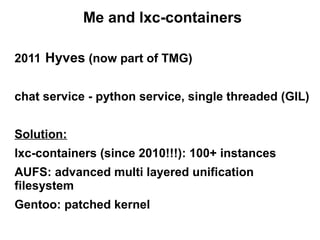
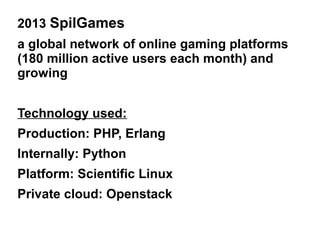
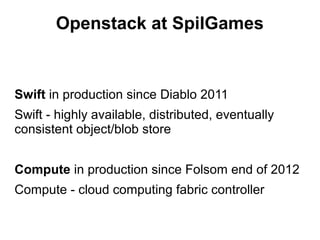
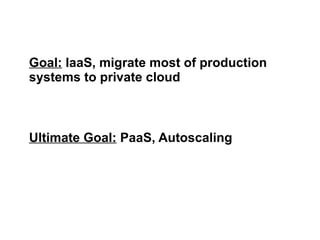
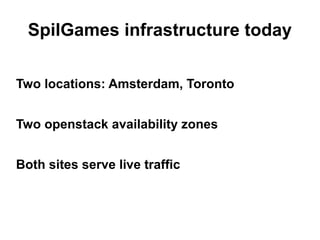
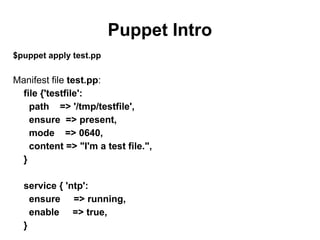
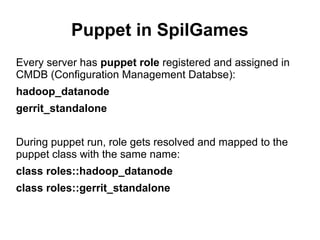
![Role classes are used as containers for the rest of puppet
classes which provide actual configuration:
class roles::gerrit_standalone inherits roles::spil_base {
class{ '::nginx':
port => 80,
}
class{ '::gerrit':
mysql_host
mysql_user
mysql_password
mysql_db
}
=> '127.0.0.1',
=> 'gerrit2',
=> 'gerrit2',
=> 'reviewdb',
class { '::mysql::server':}
mysql::db { 'reviewdb':}
Class['::nginx'] â Mysql::Db['reviewdb'] â Class['::Gerrit']
}](https://image.slidesharecdn.com/dockermeetup-140303034032-phpapp01/85/Docker-meetup-9-320.jpg)
